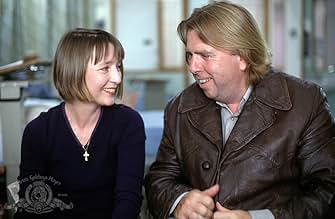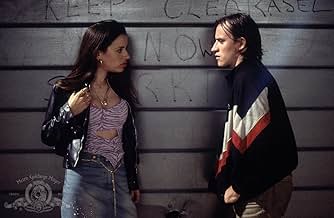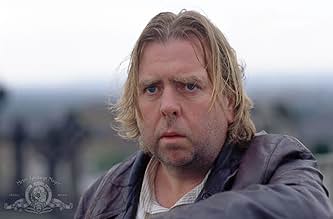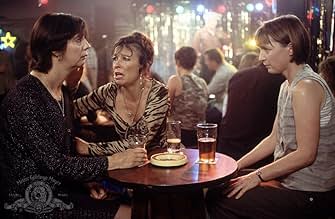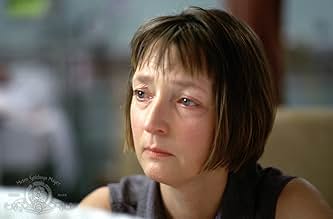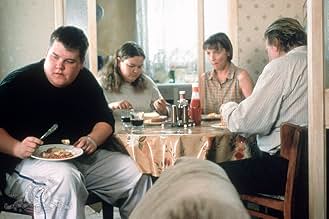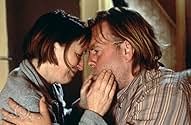All or Nothing
- 2002
- Tous publics
- 2h 8min
NOTE IMDb
7,5/10
12 k
MA NOTE
Dans un foyer pauvre de la classe ouvrière à Londres, l'amour de Penny pour son partenaire, Phil, chauffeur de taxi, se tarit, mais lorsqu'une tragédie imprévue survient, la communauté local... Tout lireDans un foyer pauvre de la classe ouvrière à Londres, l'amour de Penny pour son partenaire, Phil, chauffeur de taxi, se tarit, mais lorsqu'une tragédie imprévue survient, la communauté locale se resserre et leur flamme ressurgit.Dans un foyer pauvre de la classe ouvrière à Londres, l'amour de Penny pour son partenaire, Phil, chauffeur de taxi, se tarit, mais lorsqu'une tragédie imprévue survient, la communauté locale se resserre et leur flamme ressurgit.
- Réalisation
- Scénario
- Casting principal
- Récompenses
- 3 victoires et 13 nominations au total
Avis à la une
The previous reviewers describe the story's chemistry adequately. But why all or nothing?
Contrary to the other comments I did not find the protrayal dreary or depressing. To do so seems to me to show a lack of awareness of the people who live and work near us or for us; who breathe the same air we do.
These people don't live in a slum or a housing development. They live in their homes. They do not portray, as in too many other movies, special effects empty violence or emotionless skin sex scenes. They beg us to consider and respect the lives they really live and their search for the fuel to continue tomorrow. They don't need everything; they don't need it all. They simple need enough to enable their emotional existence, that's all; otherwise they have nothing.
"All or Nothing" finally arrived in Honolulu where there are people with dialects different from London and yet have the very same vacancies in their lives.
I vote to clone Director Mike Leigh!!
Contrary to the other comments I did not find the protrayal dreary or depressing. To do so seems to me to show a lack of awareness of the people who live and work near us or for us; who breathe the same air we do.
These people don't live in a slum or a housing development. They live in their homes. They do not portray, as in too many other movies, special effects empty violence or emotionless skin sex scenes. They beg us to consider and respect the lives they really live and their search for the fuel to continue tomorrow. They don't need everything; they don't need it all. They simple need enough to enable their emotional existence, that's all; otherwise they have nothing.
"All or Nothing" finally arrived in Honolulu where there are people with dialects different from London and yet have the very same vacancies in their lives.
I vote to clone Director Mike Leigh!!
I really like this guy; he did Secrets and Lies, and Happy-Go-Lucky, and I'm about to check out "Life is Sweet." I'm on some nostalgic, vintage Britain trip. I first saw All or Nothing about 10 years ago, on cable, and came in halfway and, being an American, the times it was put on cable were about once every several years. And at the time I was in high school and didn't have my own personal computer or money to order a DVD so I just vaguely sulked missing this film. Now that I have my own means to hunt the film out I'm so glad I have! And with my trusty dusty internet I am able to see all these VHS gems I've stored over the years, like the first movies I mentioned, have the same director. So I feel I'm doing something right as far as taste, or Mike Leigh is.
The film is about a connection of lives on a council estate/public housing complex. There's a couple with two kids that are less than models and not exactly skilled office workers, and neither are the parents. It's an overweight family of care home workers, supermarket workers, cabbies, and a bone-idle brat. You get the mother who has late-night timeouts to herself to grieve her existence, and the dad who digs for loose change under the cushions his couch potato son lounges on, a scene that silently, ironically shows how the cycle of poverty will continue within this family.
Then there's the mother's friend, who is a drunk and her daughter is the council slag basically, who tries to steal the boyfriend of her mother's other friend's daughter. The daughter is Donna, a right stroppy girl who values her looks and nothing else of herself, which gives her a bad attitude that ruins her looks; the entire film she has a rough sneer on her face, or tear-stained makeup.
The film shows the stereotypes without inducing eyerolls. Just like in Secrets and Lies (an AMAZING FILM that gives you laughs and tears), the soundtrack isn't cliché rap music to add to the mood of the urban setting, but it's somber violin music and no offputting lyrics. I don't know if the violin music is done to be ironic or if it's a way to ease and appease the upper-class or older viewers who probably need a break from all the aggression. But it's a contrast and kind of makes me giggle because it's music you'd hear in a Jane Eyre miniseries, and not in a film about rough "chavs" (I hate that word, but it's an inevitable and long standing part of English society, so.)
Speaking of, then there's stuff like Daniel Mays who plays Donna's boyfriend, and his strong accent, and his entire script along with the other characters' is a rather intriguing glossary of chav slang like "doing my head in" and "bollocks" and "having a laugh"...it's endless yet not nauseating or annoying or forced. I'm not quite sure how much was ad-libbed/"mumblecore," or Mike Leigh's hand but I raised an impressed eyebrow at how Mike Leigh was able to do that, use that underclass attitude to add to the realism while making it funny without mocking them or ruining the film. So the social context of British historical and current events that create the too real contemporary "chav" culture is strong here, and Mike Leigh nicely portrays this bleak society somehow in many of his films.
My only bone to pick is the actress who plays Donna. At first it seems like she is overdoing it but I know young women really do act this way and with their mums. Plus, she is pregnant, which makes women moody sometimes, and she has every reason to be angry if you look at the very utilised backdrop of impoverished tower blocks and screaming neighbours and a horrible boyfriend. It seems the actress has to really put on this hard act and bad attitude and her incessant "Shuh-ups!" to emphasise that her character is a chav and not a "regular" London girl. It's this attitude and accent and lingo that sets "chavs" apart from others, though they are a huge part of the demographic makeup in England and other parts of Britain. So I got over it. It is a bit crazy though that when she's battered and falls pregnant does this bring her and her single mother together.
I think this lifestyle of unintelligent people was shown very intelligently. On the cable that I have it was ranked with 2 1/2 out of 4 stars. I know critics can be fickle but I was wondering why it didn't at least get 3. So perhaps the harsh setting and reality of white Brits (who are classically and mostly shown in film and art and music to be posh, upper-classed, intellectual) being shown here as the complete opposite was a hard pill to swallow and probably written off as hammed up rubbish, but no. I think it's got a skeleton of reality here under the embellishing skin of dramatic fights, and relationships, like Sally Hawkins flirting with a mentally challenged kid and how she chomps on gum the entire time and keeps flaring her nostrils. I'm not British so I don't know how many "rude girls" strut around provocatively on the estate all day, but regardless I don't think she played the role well to be honest. Someone *like* Lauren Socha perhaps, who can play chav rather naturally and endearingly.
Anyway there's nothing here that I find unrealistic as far as the households and characters within and around, nor the situations they're in, nor how most of the actors/actresses played them, albeit some over the top, and I really appreciate this tour through the other half of British real life. Fine writer/director.
The film is about a connection of lives on a council estate/public housing complex. There's a couple with two kids that are less than models and not exactly skilled office workers, and neither are the parents. It's an overweight family of care home workers, supermarket workers, cabbies, and a bone-idle brat. You get the mother who has late-night timeouts to herself to grieve her existence, and the dad who digs for loose change under the cushions his couch potato son lounges on, a scene that silently, ironically shows how the cycle of poverty will continue within this family.
Then there's the mother's friend, who is a drunk and her daughter is the council slag basically, who tries to steal the boyfriend of her mother's other friend's daughter. The daughter is Donna, a right stroppy girl who values her looks and nothing else of herself, which gives her a bad attitude that ruins her looks; the entire film she has a rough sneer on her face, or tear-stained makeup.
The film shows the stereotypes without inducing eyerolls. Just like in Secrets and Lies (an AMAZING FILM that gives you laughs and tears), the soundtrack isn't cliché rap music to add to the mood of the urban setting, but it's somber violin music and no offputting lyrics. I don't know if the violin music is done to be ironic or if it's a way to ease and appease the upper-class or older viewers who probably need a break from all the aggression. But it's a contrast and kind of makes me giggle because it's music you'd hear in a Jane Eyre miniseries, and not in a film about rough "chavs" (I hate that word, but it's an inevitable and long standing part of English society, so.)
Speaking of, then there's stuff like Daniel Mays who plays Donna's boyfriend, and his strong accent, and his entire script along with the other characters' is a rather intriguing glossary of chav slang like "doing my head in" and "bollocks" and "having a laugh"...it's endless yet not nauseating or annoying or forced. I'm not quite sure how much was ad-libbed/"mumblecore," or Mike Leigh's hand but I raised an impressed eyebrow at how Mike Leigh was able to do that, use that underclass attitude to add to the realism while making it funny without mocking them or ruining the film. So the social context of British historical and current events that create the too real contemporary "chav" culture is strong here, and Mike Leigh nicely portrays this bleak society somehow in many of his films.
My only bone to pick is the actress who plays Donna. At first it seems like she is overdoing it but I know young women really do act this way and with their mums. Plus, she is pregnant, which makes women moody sometimes, and she has every reason to be angry if you look at the very utilised backdrop of impoverished tower blocks and screaming neighbours and a horrible boyfriend. It seems the actress has to really put on this hard act and bad attitude and her incessant "Shuh-ups!" to emphasise that her character is a chav and not a "regular" London girl. It's this attitude and accent and lingo that sets "chavs" apart from others, though they are a huge part of the demographic makeup in England and other parts of Britain. So I got over it. It is a bit crazy though that when she's battered and falls pregnant does this bring her and her single mother together.
I think this lifestyle of unintelligent people was shown very intelligently. On the cable that I have it was ranked with 2 1/2 out of 4 stars. I know critics can be fickle but I was wondering why it didn't at least get 3. So perhaps the harsh setting and reality of white Brits (who are classically and mostly shown in film and art and music to be posh, upper-classed, intellectual) being shown here as the complete opposite was a hard pill to swallow and probably written off as hammed up rubbish, but no. I think it's got a skeleton of reality here under the embellishing skin of dramatic fights, and relationships, like Sally Hawkins flirting with a mentally challenged kid and how she chomps on gum the entire time and keeps flaring her nostrils. I'm not British so I don't know how many "rude girls" strut around provocatively on the estate all day, but regardless I don't think she played the role well to be honest. Someone *like* Lauren Socha perhaps, who can play chav rather naturally and endearingly.
Anyway there's nothing here that I find unrealistic as far as the households and characters within and around, nor the situations they're in, nor how most of the actors/actresses played them, albeit some over the top, and I really appreciate this tour through the other half of British real life. Fine writer/director.
Mike Leigh makes this movie as a sociological study because he wants us to be confronted with the state of mind of the working class of now. There is more poverty in the slums nowadays than say twenty years ago! Family-life is disrupted and children have many problems: overweight, sexual harassment, abortion (?). How will the rent be paid? And the loan of the taxi? What is going on in the mind of our son who does only look television and eat until he becomes fat? Why is my woman unhappy, do we still talk to each other? We are proud of our daughter who is a nurse for elderly people, but what is happening with our son? Even the dialogues in the taxi are splendid!
I have just returned from a special advance showing of "All Or Nothing" at my local UGC and I must say, this film exceeded my expectations enormously.
The film is about the lives of one family in a council estate and how each member interacts with the community. The Father, Phil Bassett (Timothy Spall) works as a Taxi driver while his wife Penny (Lesley Manville) is a checkout operator at a local supermarket. They are unmarried but have two children Rachel and Rory, the former being an angst-ridden, overweight layabout who is key to the film.
Acting is superb. It is that simple. All but one performance is utterly convincing, especially Timothy Spall with his constant bemused grimace which sets the mood of both his character and the film. The one exception is Donna played by Helen Coker. Her role is played up too much and seems rather forced. Now if by any chance you're reading Helen, please don't be disheartened; I merely saw you as the "least best" of an excellent bunch and I have to criticise something!
The script is authentic, witty and full of emotion while not being repetitive (barring the word "alright"!).
"All Or Nothing" is one of the greatest portrayals of what it is REALLY like to be part of a down-on-your-luck working class family. I even believe the film ended too soon; there were a few ideas that could have been developed further. I mention this not as a criticism but as a tribute to Mike Leigh who actually made we wish this 2hr 28 minute film would go on!
Fantastic! Eight out of ten!!!
The film is about the lives of one family in a council estate and how each member interacts with the community. The Father, Phil Bassett (Timothy Spall) works as a Taxi driver while his wife Penny (Lesley Manville) is a checkout operator at a local supermarket. They are unmarried but have two children Rachel and Rory, the former being an angst-ridden, overweight layabout who is key to the film.
Acting is superb. It is that simple. All but one performance is utterly convincing, especially Timothy Spall with his constant bemused grimace which sets the mood of both his character and the film. The one exception is Donna played by Helen Coker. Her role is played up too much and seems rather forced. Now if by any chance you're reading Helen, please don't be disheartened; I merely saw you as the "least best" of an excellent bunch and I have to criticise something!
The script is authentic, witty and full of emotion while not being repetitive (barring the word "alright"!).
"All Or Nothing" is one of the greatest portrayals of what it is REALLY like to be part of a down-on-your-luck working class family. I even believe the film ended too soon; there were a few ideas that could have been developed further. I mention this not as a criticism but as a tribute to Mike Leigh who actually made we wish this 2hr 28 minute film would go on!
Fantastic! Eight out of ten!!!
Phil (Timothy Spall) is an overweight taxi driver who gets up late in the day and works intermittently, barely communicating with his family except for a few grunts. His philosophy of life is expressed as "We're all born alone. We die alone. There's nothing we can do about it". Mike Leigh has given us powerful portrayals of the underclass in his previous films Naked, Secrets and Lies, and Life is Sweet but none more powerful and moving than his latest, All or Nothing.
In this film, Leigh looks at three families living in a dreary South London housing complex and captures their lives with an intimacy that is almost unbearable. All or Nothing has a documentary feel, almost as if the camera was just planted in the middle of the living room to observe. The conditions are familiar: unemployment and underemployment, alcoholism, teen pregnancy, isolation, and the inevitable loss of self-esteem and despair. It is, however, more than a drama of oppressive social conditions, but also of lack of communication between people who desperately need love but are too afraid or lethargic to ask for it.
Spall's performance is a revelation. His unshaven face, disheveled hair, and hangdog expression communicate deep resignation. The film is bleak but Leigh mixes its heartbreak with joy. When a neighbor Maureen (Ruth Sheen) sings ''Don't It Make My Brown Eyes Blue,'' at a karaoke bar, her eyes shine with a glow that seems at odds with the rest of her life but is so contagious that even her most dispirited friends take notice.
It is obvious, from the start that something is amiss. Phil says nothing when his obese son Rory (James Cordon) hurls words of abuse at his common-law wife Penny. Rory is an overweight bully who does nothing but lay around the house, watching TV and hurl insults at everyone in his path. Sister Rachel (Alison Garland) has a job cleaning up at a nursing home but also seems to be going through the motions of living except when she is interacting with patients. Penny works in a supermarket and does just about everything to keep the family going, but it never seems to be enough. The film's sub-plots add to the feeling of life reeling out of control, but none of these are fully developed and are just dropped without tying up the loose ends. Maureen's teenage daughter is pregnant by some lout that doesn't give two hoots about her. Another resident, unemployed Samantha (Sally Hawkins) hates her parents and finds herself seducing a very strange young man (Ben Crompton) lurking in the shadows of the complex grounds.
The second half of the film concentrates mainly on Phil and his family. When a medical emergency occurs, the family begins to open up and express long buried feelings of hurt and resentment. The final confrontation between Phil and Penny achieves an explosive power. Phil tells Penny that when he's had enough, he just switches off the meter on his taxi. Penny responds that she doesn't have the luxury of turning off a switch and making everything go away, that she is still responsible for the daily chores and the condition of the family. After Phil finally reveals his deepest fears, a transformation occurs that is unmistakably reflected in the family's facial expressions and body language.
Leigh does not offer simple solutions, but seems to be telling us that although life is painful, we can reach beyond the pain to get in touch with the beauty. He shows us that love is the glue that holds families together and that either there is love or there's nothing. As a result, All or Nothing pulsates with a humanity that, in spite of its bleakness, is life affirming and ultimately uplifting, reminding us that beyond bitterness, there is love, and beyond suffering, there is grace.
In this film, Leigh looks at three families living in a dreary South London housing complex and captures their lives with an intimacy that is almost unbearable. All or Nothing has a documentary feel, almost as if the camera was just planted in the middle of the living room to observe. The conditions are familiar: unemployment and underemployment, alcoholism, teen pregnancy, isolation, and the inevitable loss of self-esteem and despair. It is, however, more than a drama of oppressive social conditions, but also of lack of communication between people who desperately need love but are too afraid or lethargic to ask for it.
Spall's performance is a revelation. His unshaven face, disheveled hair, and hangdog expression communicate deep resignation. The film is bleak but Leigh mixes its heartbreak with joy. When a neighbor Maureen (Ruth Sheen) sings ''Don't It Make My Brown Eyes Blue,'' at a karaoke bar, her eyes shine with a glow that seems at odds with the rest of her life but is so contagious that even her most dispirited friends take notice.
It is obvious, from the start that something is amiss. Phil says nothing when his obese son Rory (James Cordon) hurls words of abuse at his common-law wife Penny. Rory is an overweight bully who does nothing but lay around the house, watching TV and hurl insults at everyone in his path. Sister Rachel (Alison Garland) has a job cleaning up at a nursing home but also seems to be going through the motions of living except when she is interacting with patients. Penny works in a supermarket and does just about everything to keep the family going, but it never seems to be enough. The film's sub-plots add to the feeling of life reeling out of control, but none of these are fully developed and are just dropped without tying up the loose ends. Maureen's teenage daughter is pregnant by some lout that doesn't give two hoots about her. Another resident, unemployed Samantha (Sally Hawkins) hates her parents and finds herself seducing a very strange young man (Ben Crompton) lurking in the shadows of the complex grounds.
The second half of the film concentrates mainly on Phil and his family. When a medical emergency occurs, the family begins to open up and express long buried feelings of hurt and resentment. The final confrontation between Phil and Penny achieves an explosive power. Phil tells Penny that when he's had enough, he just switches off the meter on his taxi. Penny responds that she doesn't have the luxury of turning off a switch and making everything go away, that she is still responsible for the daily chores and the condition of the family. After Phil finally reveals his deepest fears, a transformation occurs that is unmistakably reflected in the family's facial expressions and body language.
Leigh does not offer simple solutions, but seems to be telling us that although life is painful, we can reach beyond the pain to get in touch with the beauty. He shows us that love is the glue that holds families together and that either there is love or there's nothing. As a result, All or Nothing pulsates with a humanity that, in spite of its bleakness, is life affirming and ultimately uplifting, reminding us that beyond bitterness, there is love, and beyond suffering, there is grace.
Le saviez-vous
- AnecdotesFirst cinema feature of Sally Hawkins.
- ConnexionsFeatured in The South Bank Show: Mike Leigh (2002)
Meilleurs choix
Connectez-vous pour évaluer et suivre la liste de favoris afin de recevoir des recommandations personnalisées
- How long is All or Nothing?Alimenté par Alexa
Détails
- Date de sortie
- Pays d’origine
- Langues
- Aussi connu sous le nom de
- Untitled Mike Leigh Project
- Lieux de tournage
- Sociétés de production
- Voir plus de crédits d'entreprise sur IMDbPro
Box-office
- Budget
- 9 000 000 $US (estimé)
- Montant brut aux États-Unis et au Canada
- 201 546 $US
- Week-end de sortie aux États-Unis et au Canada
- 25 890 $US
- 27 oct. 2002
- Montant brut mondial
- 2 847 049 $US
- Durée2 heures 8 minutes
- Couleur
- Mixage
- Rapport de forme
- 1.85 : 1
Contribuer à cette page
Suggérer une modification ou ajouter du contenu manquant

Lacune principale
By what name was All or Nothing (2002) officially released in India in English?
Répondre
